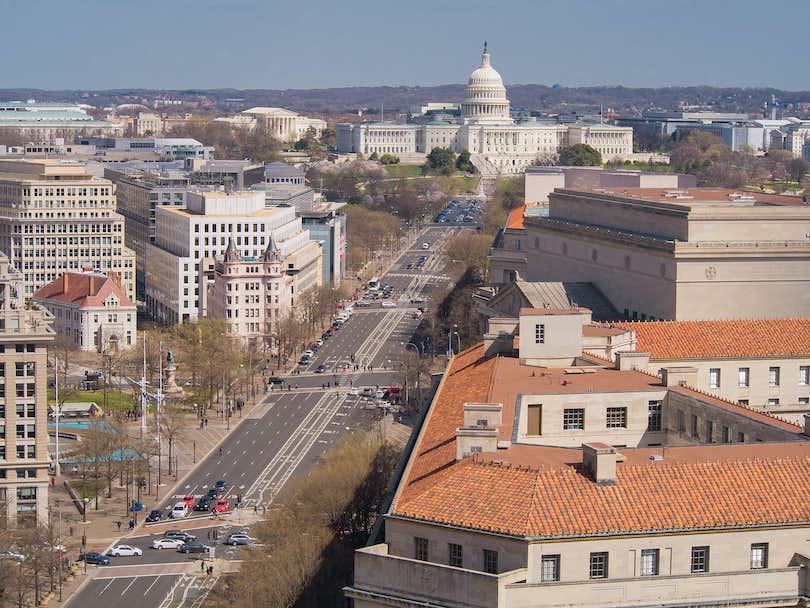Washington, D.C. is a beautiful city filled with historical monuments, great food, and culture. When considering moving to the US capital, you’ll need to decide whether you want to rent or buy your lodgings. In this article, we’ll take a look at each option to help you make an informed decision.

With its stunning architecture, fantastic public transportation, and blossoming arts scene, Washington, D.C. has become more than just a place for government and politics. The capital city has developed a flair all its own, replete with cozy coffee shops, hip restaurants, and bookstores that you can get lost in for hours.
If you’ve considered making the move to D.C., you’ve likely wondered whether it makes more sense to rent or buy in this vibrant city. Unfortunately, there’s no simple answer to the question: your own personal and financial situation will dictate which is the superior option.
However, by evaluating the current real estate market climate in the area in conjunction with your own personal situation, you’ll have an easier time coming to a decision. In this article, we’re going to take a look at the D.C. real estate market, examine the ups and downs of both renting and buying in Washington, D.C., and give you some advice on what may work best for you.
Find out if you qualify for Clever Cash Back!
Eligible Clever buyers get a check for thousands back after closing.
The Real Estate Market in Washington, D.C.
The D.C. real estate market has definitely seen better days. While the median home value is still fairly high compared to the rest of the country, clocking in at a respectable $573,900, the market is cooling off and home values are expected to decrease by 0.5% in the coming year.
There is a fair amount of price variety between different neighborhoods, but not as much as you can find in other cities like Seattle. NoMa, for example, has a median home value of $462,800, while Bloomingdale’s median home value is $843,100. All median values across all neighborhoods fall within approximately $400,000 of each other.
Although D.C.’s real estate market as a whole isn’t doing particularly well, there are certain neighborhoods that are expected to see an increase in home values within the next year. NoMa’s median home value is projected to increase by 4.3%, and home values in Bloomingdale are also predicted to grow by 2.6%.
The median home value in Judiciary Square, however, is expected to decrease by 0.7% this year, and Mount Vernon Square is projected to see a housing value depreciation of 2.8%. Mount Vernon Square currently has the worst market projection in D.C. for this year.
While D.C. isn’t doing great, it’s definitely not doing terribly: although there is some significant depreciation predicted in some neighborhoods, the city as a whole appears to only be experiencing only a minor dip in housing values. This indicates that the market is somewhat undecided — values may resume an upward trend, or they may begin to go down for a period of time.
Advantages of Renting
When the future of a market is so unclear, it can often be a good idea to wait things out and see where prices go in the near future before buying a property. Renting gives you the option of living in the city without any substantial commitment: if values go up and it looks like the market is doing well, great! You’ll still have the option of buying property after a few months but with more confidence that your home will appreciate in value.
However, if it doesn’t look like the market has decided on a solid direction yet, you can wait until it seems prices have bottomed out. While it can be incredibly hard (if not impossible for amateurs) to time a market like this, there’s not much harm done in waiting a little while if you plan to buy a property eventually, anyway. Just make sure you don’t wait too long, or you can end up wasting money on rent that could have otherwise been put towards buying a home.
All in all, renting gives you the ability to pick up and leave whenever you want: once your lease is up, you can simply move into an entirely new place. This can be particularly useful when you’re new to a city, as you can live in a few different apartments in different areas and see which you like best. Each D.C. neighborhood has its own unique style, and it would be very helpful to get some firsthand experience of the different flavors of the city before settling down for the long haul.
Furthermore, if you’re not sure you’ll be in D.C. for a long period of time, renting is almost definitely the better option. While buying property can be a fantastic investment, if you plan to be in the city for only a few months to a year, buying probably won’t make sense for you.
Advantages of Buying
When you buy a house, you’re not just paying for a place to live, but for a powerful financial asset as well. Just like stocks, homes increase and decrease in value, and if you buy your house while the market is down and sell it once it picks up again, you can make a nice profit.
However, the financial perks of homeownership don’t end there: once you’ve built up enough equity in your home you can take out a home equity loan or HELOC (home equity line of credit). Both of these allow you to use your home as collateral to secure a loan or credit line. While they can be somewhat risky loans (you lose your house if you default), having the option available is a nice perk to owning a home.
In the end, as long as you plan to stay in Washington, D.C. for a substantial amount of time, buying is generally the preferred option. While renting does give you the freedom of mobility, you don’t have any stake in the property itself. This means that even after years of renting — potentially paying the entire cost of the property in rent — as soon as you stop paying, you lose everything.
Even though the D.C. market is experiencing a slight cooldown right now, real estate is generally considered one of the safest investments you can make. In almost all cases, real estate will eventually begin to appreciate in value over time. The best thing you can do is get in touch with a local real estate agent who can answer any questions you may have and guide you through the buying process if that’s the route you decide to take.
If you’re thinking of buying a house or apartment in Washington, D.C., Clever can help! Our Partner Agents can offer you advice and support as you search for your next home.
To get in touch with an experienced real estate agent in your area, just fill out our form and we’ll reach out to you shortly to help you find the perfect D.C. home.

